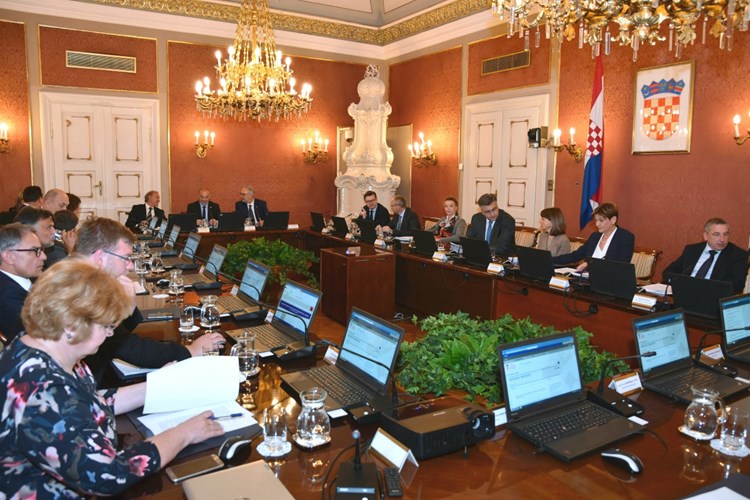- Published: 10.05.2018.
The government adopted the Strategy for the introduction of the euro as the official currency in the Republic of Croatia
The government on Thursday adopted the strategy for the adoption of the euro as the legal tender in Croatia, and Economy Minister Martina Dalic said that the introduction of this currency could be expected in five to seven years' time.
Joining the euro area is one of the obligations we assumed under the Treaty of Accession to the European Union, however, the treaty does not specify the date when Croatia is supposed to introduce the euro as the legal tender, it depends on each member-state, Dalic told the government.
She informed the cabinet members that there were the two types of criteria for the euro adoption: a set of criteria for nominal convergence and a set of criteria for real convergence.
When it comes to the first set, including fiscal deficit, trends and the amount of the public debt, price stability, exchange-rate stability and long-term interest rates, Croatia has already met those criteria to a large extent, according to Dalic.
The real convergence criteria is about the pace of the catch-up process when it comes to a level of of income in Croatia in comparison to the European Union wage level. Our level is on par to the average level which other member-states had when they launched the process of introducing the euro, she said.
To accelerate the real convergence is our permanent duty which we have to do in the coming period, and is in connection with many measures being undertaken in the economic system, Dalic said.
Entering the Exchange Rate Mechanism (ERM II) for at least two years before adoption of the euro is also one f the conditions.
The pertinent activities will be conducted and coordinated by the Croatian National Bank with the European system of central banks.
In the economic terms, Croatia is a very good candidate for the conversion to the euro, and suitable candidate to take part in the euro area. One of the benefits for the euro introduction is the removal of exchange rate risks in the economy, the minister said.
The costs of the introduction are short-term, she added.
As many as 80% of savings deposits in Croatia are indexed to the euro, she noted.
In relation to the price trends upon the conversion, the strategy assesses that prices might go up between 0.2% and 0.4% on average in short term.
Dalic said that preparations would be made to cushion such effects on the prices.
The government on Thursday sent to parliament a draft legislation on a liquefied natural gas terminal which would enable the implementation of the strategic project of the LNG terminal on the northern Adriatic island of Krk within deadlines.
"The project has strategic importance, we talk about it a lot and it has triggered off disputes and resistance in local self government units. However, we believe that with this special law we can resolve the diversification of the gas supply in the most efficient way, taking into account all environmental aspects, and place Croatia on Europe's energy map," said Prime Minister Andrej Plenkovic.
A state secretary in the Environmental Protection and Energy Ministry, Mile Horvat, said it was in Croatia's interest to secure a fast realisation of the LNG terminal on Krk to preserve natural gas supply security and position Croatia on the European energy market.
"The bill will help this strategic project for Croatia be realised within the set deadlines," said.
The law on exploration and exploitation of hydrocarbon expected to boost investment
The government sent to parliament for a second reading a bill on exploration and exploitation of hydrocarbons which defines jurisdiction for certain jobs, including the necessary activities in the realisation of exploration and exploitation of hydrocarbons and geothermal waters, natural gas storage and permanent disposal of carbon dioxide, in accordance with international practice and directives.
The Croatian government at its session on Thursday sent to parliament draft amendments to the law on education and upbringing in elementary school which defines the purpose, objectives, structure and the way of adopting documents pertaining to the curricular reform.
The amendments, among else, allow a 30% wage increase for teachers who take part in EU projects implemented in schools.
"We are confident this will also increase the efficiency in absorbing money from EU funds," said Science and Education Minister Blazenka Divjak.
The amendments pave the way to securing budgetary funds for projects, in accordance with public and private partnership. The amendments also envisage reconstruction of damaged and construction of new school facilities.
The amendments also introduce an evaluation system in the process of hiring new candidates.
